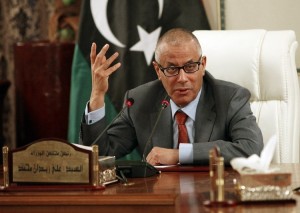
The kidnapping of Libya’s Prime Minister Ali Zeidan from a hotel in the Libyan capital Tripoli has triggered a rise in Brent oil (Photo: Reuters – taken in July 2013)
Tripoli – The leader of oil-rich Libya is said to be “in good health” after being seized by armed gunmen from a hotel in the country’s capital, Tripoli, on Thursday.
Reports indicate Ali Zeidan is being held at the Interior Ministry’s anti-crime department and is in good health.
The dawn raid reportedly came just hours after Zeidan had met with the family of a Libyan al Qaeda suspect who was seized by US special forces in Tripoli at the weekend.
“The head of the transitional government, Ali Zeidan, was taken to an unknown destination for unknown reasons,” the government said in a statement on its website following the abduction.
Reuters subsequently quoted an official at the Interior Ministry as saying Zeidan was being detained there and was “in good health and will be treated well as a Libyan citizen”.
Two of Zeidan’s guards were also snatched from the Corinthia hotel and beaten up, but they were later released.
The director of communications to the prime minister, Amel Jerary, denied reports that Libya’s finance minister was also kidnapped.
The abductors are believed to be former Libyan rebels, with the government blaming it on the Tripoli Revolutionaries Control Room and the Committee for Fighting Crime.
A group of rebels later claimed the seizure, saying it was in response to the abduction of the al Qaeda suspect, known as Abu Anas al Libi, in which they believe the government colluded with the US.
A spokesperson for one of the alleged abductor groups was attributed as saying: “(Zeidan’s) arrest comes after the statement by (US Secretary of State) John Kerry about the capture of Abu Anas al Libi, after he said the Libyan government was aware of the operation.”
Zeidan is said to have met with al Libi’s family late on Wednesday.
Al Libi was wanted by the US over his alleged connection with the 1998 bombings of US embassies in Kenya and Tanzania.
Libya has been in turmoil ever since the removal of Muammar Gaddafi from power two years ago and the fragile central government has been struggling to rule a country fragmented by conflicting tribal loyalties.
“Prime Minister Ali Zeidan’s Libya sounds like a country on the verge of splitting into a jigsaw of rebellious enclaves each with their own government, militias and, importantly, their own share of Organisation of Petroleum Exporting Countries (Opec) member Libya’s oil,” said a report.
Libya’s oil output has risen to 700,000 barrels per day, after falling at mid-year to its lowest since the country’s 2011 civil war.
“This kind of news shows the uncertainty over Libyan [oil supply],” said Ken Hasegawa, a commodity sales manager at Newedge Japan.
Libya holds Africa’s biggest oil reserves pumps about 40% of the world’s crude. The nation’s output last month slumped to the lowest in the 12-member Opec group.
Crude oil prices rose following news of Zeidan’s seizure.
This week bank giant HSBC released a report claiming that the Arab Spring would cost the Middle East and North Africa $800 billion in lost output over a four-year period to the end of 2014.
It also said that economic growth in Libya would be kept at just 0.7% against a previous estimate of 15.9%.
The country continues to struggle amid production issues as political and social upheaval persists.
Meanwhile, unconfirmed report just coming in says the Libyan Prime Minister Ali Zeidan has reportedly been freed a matter of hours after he was seized by armed gunmen at a Tripoli hotel.


